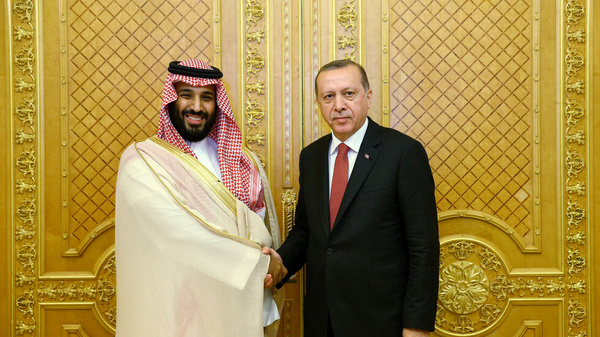Speaking in an interview with the website of the Strategic Council on Foreign Relations, Siamak Kakai commented on the background of Turkey’s disputes with Arab countries, especially Saudi Arabia, and said: Developments in the Middle East after the formation of unrest in the Arab world, or the Arab Spring, had a profound effect on the foreign policy of countries in the region, including Turkey. In fact, Turkey, which was undergoing transformation in pursuit of presenting a model and political pattern to Arab countries, suddenly changed its foreign policy approach and entered into a period of tension with important countries from North Africa to the Persian Gulf and from there to its borders in Syria.
He stressed: One of the actors with which Turkey’s relations were strained was Saudi Arabia. This tension in Riyadh-Ankara relations took shape since Turkey’s policy towards Egypt changed after General al-Sisi took office. Meaning that the policies of Saudi Arabia and Turkey towards Egypt were at odds; Turkey supported the Muslim Brotherhood, but Arab countries such as the UAE and Saudi Arabia opposed the Brotherhood and supported General al-Sisi. At the same time, those Arab countries were concerned about Turkey’s ambitions in supporting the Brotherhood and its impact on their regional activities.
According to the expert, after that other events contributed to the further deterioration of relations between Ankara and Riyadh, such as the assassination of Khashoggi in Turkey and its aftermath, the two countries’ confrontation in Qatar and increase in Ankara-Doha military cooperation and Turkey’s tensions with some Arab countries in the Eastern Mediterranean, which somehow put the country into isolation. For this reason, the level of trade and capital relations between Arab countries such as Saudi Arabia and the UAE with Turkey decreased significantly.
In response to the question that what influenced Turkey’s recent consultations with the UAE and Saudi Arabia, and whether such interactions are the beginning of Turkey’s return to the Middle East region, Kakai said: The implications and challenges of Turkish foreign policy in the peripheral regions, as well as the adventures that Turkey has made in the field of foreign policy in recent years, have had a major negative impact on the country’s currency and economic situation: to the extent that it led to a sharp devaluation of the lira against foreign currencies. Such issues, along with Turkey’s tensions with Europe and the United States, have prompted Erdogan to reconsider relations with countries in the Middle East, especially Saudi Arabia.
He added: On the one hand, the turn in foreign policy and redefinition of relations with Riyadh, and on the other hand, Turkey’s need for Arab capital, has set the situation in a new direction.
Pointing out that it is important for Saudi Arabia to enter into a redefined relationship with Turkey, Kakai said: Because Riyadh, and in particular the bin Salman himself, are trying to get past the costly case of Khashoggi’s assassination, and on the other hand Saudi Arabia is seeking a new regional role and influence in the Persian Gulf, Iraq, the east and north of the Middle East and North Africa.
The expert on Turkey affairs, saying that de-escalation in relations with countries such as Turkey and Iran is of concern to Saudi Arabia, added: The green light for the two sides under the complex situation of relations, means that the two sides are tired of continuing tension, and with high-level meetings between the two countries, a new phase of relations between Riyadh and Ankara will be started.
He explained: At the same time, Turkey, while needing Arab investments that have led the country to the UAE, Saudi Arabia and Qatar, is trying to solve its problems in the Eastern Mediterranean. Although the geography of those countries is not in the Mediterranean, they have an effective influence on regional equations.
Regarding the future of Turkish foreign policy, the expert stressed: It is predictable that in this direction Turkey will try to form new relations with Egypt and the Israeli regime. Therefore, it can be said that a new era in Turkish Middle East policy has begun after a decade of tension and conflict, in which the nature and extent of Riyadh and Turkey return to their former deep economic and political relations is very important for Erdogan; because, on the one hand, the President of Turkey is highly criticized from the perspective of domestic politics, and on the other hand, it is important for Saudi Arabia and bin Salman himself to side with Turkey in order to gain power and stabilize the foundations of the new government in Saudi Arabia.










0 Comments